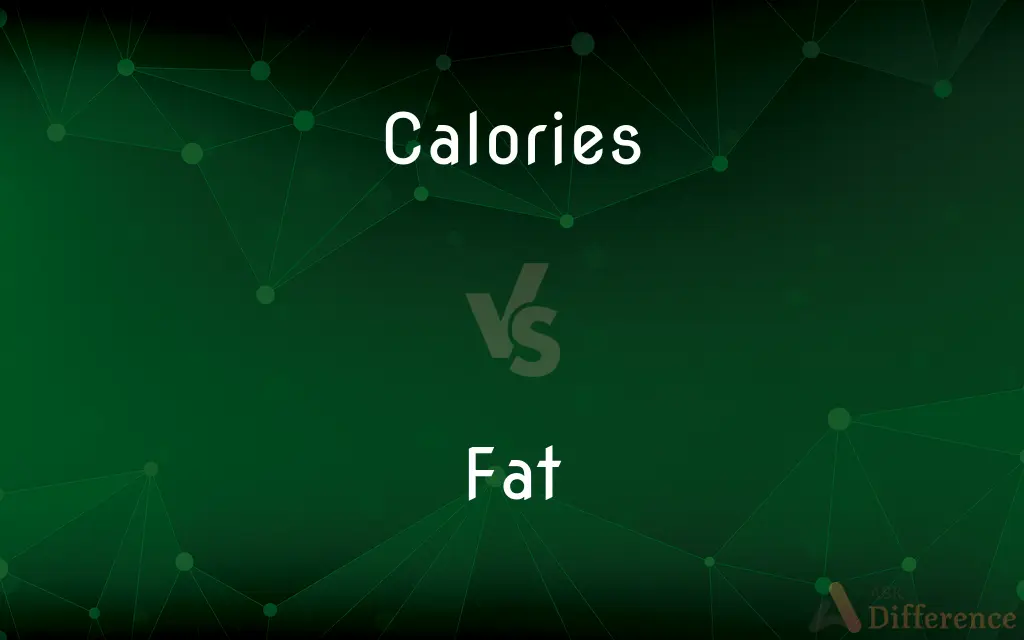Calories vs. Fat — What's the Difference?
By Tayyaba Rehman & Fiza Rafique — Published on February 6, 2024
Calories are units of energy obtained from all macronutrients, while fat is a type of macronutrient that provides 9 calories per gram.

Difference Between Calories and Fat
Table of Contents
ADVERTISEMENT
Key Differences
Calories are a measure of energy that our body gets from consuming food, encompassing all macronutrients: carbohydrates, proteins, and fats. Each macronutrient contributes a different amount of energy, with fat being the most calorie-dense, offering 9 calories per gram. In contrast, fat is a specific type of macronutrient, crucial for various bodily functions, including hormone production, nutrient absorption, and providing insulation and energy storage. While calories quantify the energy content in foods, fats specifically contribute to this energy count and play additional roles in health and nutrition.
Calories are a universal measure of energy intake and expenditure, used to balance diet and manage weight. Consuming more calories than expended leads to weight gain, often linked to excess fat accumulation. Conversely, fat is an essential dietary component, but overconsumption, especially of unhealthy fats, can lead to health issues beyond just calorie excess, such as heart disease. Understanding the difference between total calorie intake and the type of calories consumed, particularly from fats, is crucial for maintaining a balanced and healthy diet.
While all foods contain calories, not all have significant amounts of fat. For instance, fruits are low in fat but can be high in calories due to their sugar content. This distinction highlights that while managing calorie intake is vital for weight control, monitoring fat intake is equally important for overall health. Fat quality also matters, with unsaturated fats being healthier than saturated and trans fats, emphasizing that not all calories or fats are equal in terms of nutritional value and health impact.
In dietary terms, calories provide a measure for energy balance and are a primary focus in weight management. Fats, on the other hand, are scrutinized for their type and amount due to their impact on cardiovascular health and cholesterol levels. Dieticians often stress the importance of balancing calorie intake with physical activity and choosing healthy fats over unhealthy ones to promote overall health and prevent diseases.
Calories and fats are interrelated yet distinct dietary concepts. Calories serve as a broad measure of energy from all food sources, essential for life and physical activity. Fats are a specific nutrient, contributing to calorie intake and playing crucial roles in body functions, but requiring careful consumption to avoid negative health outcomes. Balancing both is key to a healthy diet and lifestyle.
ADVERTISEMENT
Comparison Chart
Definition
Measure of energy from food.
A macronutrient providing energy and supporting bodily functions.
Energy Content
Varies by macronutrient: 4 cal/g for carbs and protein, 9 cal/g for fat.
Provides 9 calories per gram.
Health Impact
Excess leads to weight gain.
Type and amount affect heart health and cholesterol.
Role in Diet
Used to calculate total energy intake.
Necessary for nutrient absorption, hormone production.
Nutritional Focus
Monitored for weight management.
Monitored for type and amount for overall health.
Compare with Definitions
Calories
Units of energy from food.
She tracks her daily calorie intake to manage her weight.
Fat
A dense source of energy in food.
Avocado is high in healthy fats.
Calories
Reference for food energy content.
The salad is low in calories but rich in nutrients.
Fat
Nutrient essential for bodily functions.
Dietary fats are crucial for hormone production.
Calories
Indicator of food's energy-giving potential.
High-calorie foods are often energy-dense and filling.
Fat
Dietary substance, varied in saturation.
Olive oil is rich in monounsaturated fats.
Calories
Measure of potential energy to be burned.
Jogging burns a significant number of calories.
Fat
The ester of glycerol and one, two, or three fatty acids.
Calories
Basis for energy balance in nutrition.
Balancing calories consumed and expended is key to maintaining a healthy weight.
Fat
Any of various soft, solid, or semisolid organic compounds constituting the esters of glycerol and fatty acids and their associated organic groups.
Calories
Abbr. cal Any of several approximately equal units of heat, each measured as the quantity of heat required to raise the temperature of 1 gram of water by 1°C at 1 atmosphere pressure. Also called gram calorie, small calorie.
Fat
A mixture of such compounds occurring widely in organic tissue, especially in the adipose tissue of animals and in the seeds, nuts, and fruits of plants.
Calories
Abbr. cal The unit of heat equal to 1/100 the quantity of heat required to raise the temperature of 1 gram of water from 0 to 100°C at 1 atmosphere pressure. Also called mean calorie.
Fat
Animal tissue containing such substances.
Calories
Abbr. Cal The unit of heat equal to the amount of heat required to raise the temperature of 1 kilogram of water by 1°C at 1 atmosphere pressure. Also called kilocalorie, kilogram calorie, large calorie.
Fat
A solidified animal or vegetable oil.
Calories
A unit of energy-producing potential equal to this amount of heat that is contained in food and released upon oxidation by the body. Also called nutritionist's calorie.
Fat
Obesity; corpulence
Health risks associated with fat.
Calories
Plural of calorie
Fat
Unnecessary excess
"would drain the appropriation's fat without cutting into education's muscle" (New York Times).
Calories
Plural of calory
Fat
Having much or too much fat or flesh; plump or obese.
Fat
Full of fat or oil; greasy.
Fat
Abounding in desirable elements
A paycheck fat with bonus money.
Fat
Fertile or productive; rich
"It was a fine, green, fat landscape" (Robert Louis Stevenson).
Fat
Having an abundance or amplitude; well-stocked
A fat larder.
Fat
Yielding profit or plenty; lucrative or rewarding
A fat promotion.
Fat
Prosperous; wealthy
Grew fat on illegal profits.
Fat
Thick; large
A fat book.
Fat
Puffed up; swollen
A fat lip.
Fat
To make or become fat; fatten.
Fat
Carrying more fat than usual on one's body; plump; not lean or thin.
The fat man had trouble getting through the door.
The fattest pig should yield the most meat.
Fat
Thick; large.
The fat wallets of the men from the city brought joy to the peddlers.
Fat
Bulbous; rotund.
Fat
Bountiful.
Fat
Oily; greasy; unctuous; rich said of food.
Fat
(obsolete) Exhibiting the qualities of a fat animal; coarse; heavy; gross; dull; stupid.
Fat
Fertile; productive.
A fat soil; a fat pasture
Fat
Rich; producing a large income; desirable.
A fat benefice; a fat office;
A fat job
Fat
Abounding in riches; affluent; fortunate.
Fat
Of a character which enables the compositor to make large wages; said of matter containing blank, cuts, or many leads, etc.
A fat take; a fat page
Fat
(golf) Being a shot in which the ground is struck before the ball.
Fat
(theatre) Of a role: significant; major; meaty.
Fat
Alternative form of phat
Fat
(uncountable) A specialized animal tissue with high lipid content, used for long-term storage of energy: fat tissue.
Mammals that hibernate have plenty of fat to keep them warm during the winter.
Fat
Such tissue as food: the fatty portion of (or trimmings from) meat cuts.
Ask the butcher for a few pounds of fat for our greens.
Fat
(countable) A lipid that is solid at room temperature, which fat tissue contains and which is also found in the blood circulation; sometimes, a refined substance chemically resembling such naturally occurring lipids.
Dietary fat is not the evil that it was once misapprehended to be; carbs are increasingly recognized as a bigger driver of atherosclerosis via chronic insulin resistance and the vascular processes that cascade from it.
Fat
That part of an organization deemed wasteful.
We need to trim the fat in this company
Fat
(slang) An erection.
I saw Daniel crack a fat.
Fat
(golf) A poorly played shot where the ball is struck by the top part of the club head. (see also thin, shank, toe)
Fat
The best or richest productions; the best part.
To live on the fat of the land
Fat
Work containing much blank, or its equivalent, and therefore profitable to the compositor.
Fat
A fat person.
Fat
A beef cattle fattened for sale.
Fat
(obsolete) A large tub or vessel for water, wine, or other liquids; a cistern.
Fat
(obsolete) A dry measure, generally equal to nine bushels.
Fat
To make fat; to fatten.
Kill the fatted calf
Fat
To become fat; to fatten.
Fat
To hit a golf ball with a fat shot.
Fat
A large tub, cistern, or vessel; a vat.
The fats shall overflow with wine and oil.
Fat
A measure of quantity, differing for different commodities.
Fat
An oily liquid or greasy substance making up the main bulk of the adipose tissue of animals, and widely distributed in the seeds of plants. See Adipose tissue, under Adipose.
Fat
The best or richest productions; the best part; as, to live on the fat of the land.
Fat
Work. containing much blank, or its equivalent, and, therefore, profitable to the compositor.
Fat
Abounding with fat
Fat
Exhibiting the qualities of a fat animal; coarse; heavy; gross; dull; stupid.
Making our western wits fat and mean.
Make the heart of this people fat.
Fat
Fertile; productive; as, a fat soil; a fat pasture.
Fat
Rich; producing a large income; desirable; as, a fat benefice; a fat office; a fat job.
Now parson of Troston, a fat living in Suffolk.
Fat
Abounding in riches; affluent; fortunate.
Persons grown fat and wealthy by long impostures.
Fat
Of a character which enables the compositor to make large wages; - said of matter containing blank, cuts, or many leads, etc.; as, a fat take; a fat page.
Fat
To make fat; to fatten; to make plump and fleshy with abundant food; as, to fat fowls or sheep.
We fat all creatures else to fat us.
Fat
To grow fat, plump, and fleshy.
An old ox fats as well, and is as good, as a young one.
Fat
A soft greasy substance occurring in organic tissue and consisting of a mixture of lipids (mostly triglycerides);
Pizza has too much fat
Fat
A kind of body tissue containing stored fat that serves as a source of energy; adipose tissue also cushions and insulates vital organs;
Fatty tissue protected them from the severe cold
Fat
Excess bodily weight;
She found fatness disgusting in herself as well as in others
Fat
Make fat or plump;
We will plump out that poor starving child
Fat
Having much flesh (especially fat);
He hadn't remembered how fat she was
Fat
Having a relatively large diameter;
A fat rope
Fat
Containing or composed of fat;
Fatty food
Fat tissue
Fat
Lucrative;
A juicy contract
A nice fat job
Fat
Marked by great fruitfulness;
Fertile farmland
A fat land
A productive vineyard
Rich soil
Fat
A chubby body;
The boy had a rounded face and fat cheeks
Fat
Component in food, affecting texture and taste.
The fat in butter gives pastries a flaky texture.
Fat
Stored energy and insulation in bodies.
Body fat helps to regulate temperature.
Common Curiosities
Are all calories the same?
While all calories have the same energy content, their source and nutritional value differ.
How are calories used by the body?
The body uses calories as energy for vital functions and physical activities.
Why do we count calories?
Counting calories helps manage energy intake for weight maintenance, loss, or gain.
How many calories should I consume daily?
Daily caloric needs vary based on age, gender, activity level, and health goals.
What is fat in nutritional terms?
Fat is a macronutrient that provides energy, supports cell growth, and aids in nutrient absorption.
Can eating fat lead to heart disease?
Excessive intake of saturated and trans fats can increase the risk of heart disease.
What are healthy sources of fat?
Healthy fat sources include avocados, nuts, seeds, olive oil, and fatty fish.
What are calories?
Calories are units of energy that measure the amount of energy food provides to the body.
Are fats unhealthy?
Not all fats are unhealthy; unsaturated fats are beneficial, while trans fats should be avoided.
What are the types of fat?
The main types of fat are saturated, unsaturated (including mono- and polyunsaturated), and trans fats.
Do all foods contain fat?
Not all foods contain fat; many fruits and vegetables are naturally fat-free.
Do calories affect metabolism?
Yes, calorie intake can influence metabolic rate, affecting weight and energy levels.
How much fat should I eat daily?
Dietary guidelines recommend fats should constitute 20-35% of total daily calories.
Do fats contribute to weight gain?
Excess calorie intake from fats can contribute to weight gain, but fats are essential in moderation.
Share Your Discovery

Previous Comparison
iPhone 6s vs. iPhone SE
Next Comparison
RTP vs. RTCPAuthor Spotlight
Written by
Tayyaba RehmanTayyaba Rehman is a distinguished writer, currently serving as a primary contributor to askdifference.com. As a researcher in semantics and etymology, Tayyaba's passion for the complexity of languages and their distinctions has found a perfect home on the platform. Tayyaba delves into the intricacies of language, distinguishing between commonly confused words and phrases, thereby providing clarity for readers worldwide.
Co-written by
Fiza RafiqueFiza Rafique is a skilled content writer at AskDifference.com, where she meticulously refines and enhances written pieces. Drawing from her vast editorial expertise, Fiza ensures clarity, accuracy, and precision in every article. Passionate about language, she continually seeks to elevate the quality of content for readers worldwide.













































